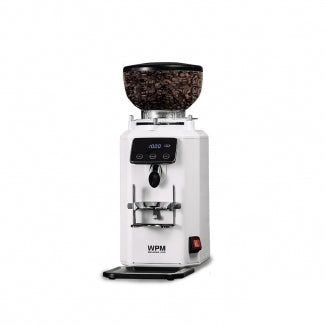Industrial Coffee Grinder Guide: Boost Efficiency and Top Quality
In the competitive landscape of coffee production, selecting the appropriate commercial coffee grinder plays a pivotal function in improving both effectiveness and product high quality. Recognizing the nuances of various grinder types and crucial features-- such as personalized work setups and durable building-- can substantially affect the final taste account of the coffee.
Comprehending Grinder Kinds
When choosing a commercial coffee mill, understanding the numerous kinds offered is vital for maximizing both flavor removal and functional performance. Both key types of grinders are blade grinders and burr grinders. Blade grinders make use of sharp blades that cut coffee beans into inconsistent dimensions, causing irregular removal and possibly unfavorable flavors. While blade grinders are often much more appropriate and economical for small procedures, they are usually not suggested for industrial use.

Inevitably, picking the appropriate sort of mill is integral to keeping top quality and effectiveness in coffee production, making it necessary for businesses to buy top notch burr grinders for ideal outcomes.
Secret Attributes to Think About
Picking a commercial coffee grinder calls for mindful consideration of numerous key attributes that can dramatically influence both efficiency and the general coffee experience. Among the key elements to evaluate is the grinding mechanism. Burr grinders are usually preferred over blade grinders, as they give a consistent grind dimension, which is essential for ideal extraction and taste.
An additional crucial attribute is the mill's capacity. A functional mill with several settings enables you to customize the work size to different developing methods, enhancing the coffee's flavor account.
Examine the mill's noise level, specifically in an active café or production atmosphere, where excessive sound can be turbulent. Spending in a mill that stabilizes these attributes can considerably improve both functional performance and the top quality of the coffee served.
Optimizing Grinding Process
To accomplish the best results in coffee preparation, enhancing the grinding procedure is necessary. The grind dimension substantially influences removal, flavor, and general top quality of the brewed coffee.


Furthermore, keeping an eye on the grinding speed can optimize the procedure. Slower grinding usually creates less warm, protecting delicate tastes and fragrances. Alternatively, much faster grinding might produce too much warmth, adversely influencing the coffee's quality.
Upkeep and Treatment Tips
Appropriate maintenance and care of commercial coffee grinders are necessary for guaranteeing optimum efficiency and long life. Regular cleaning is the structure of upkeep; residue accumulation can impact taste and grinding performance. It is suggested to cleanse the grinder after each use, cleaning down the exterior and removing any type of coffee grounds from the burrs.
Furthermore, evaluate the grinding burrs for wear and tear. Dull burrs can click here to find out more jeopardize work consistency, so they must be replaced as essential. Industrial Coffee Grinder. Occasionally calibrating the mill is likewise crucial, as this keeps the preferred grind size for various brewing techniques
Lubrication of moving parts should be performed according to the manufacturer's specifications, as this minimizes friction and prolongs the life of the equipment. It is important to utilize food-grade lubricants to make certain safety and conformity with wellness policies.
Finally, maintain the grinder in a completely dry and secure environment to avoid rust and corrosion. By sticking to these maintenance and care suggestions, operators can enhance the efficiency of their commercial coffee mills while guaranteeing high-quality result and extended functional life.
Roi Analysis
Reviewing the roi (ROI) for industrial coffee grinders is important for businesses seeking to enhance their coffee production abilities. A complete ROI analysis aids figure out the financial practicality of investing in top quality grinders, enabling businesses to evaluate the preliminary costs versus possible gains.
Examine the acquisition rate of the grinder, consisting of installation and any kind of required adjustments to existing infrastructure. High-performance mills frequently lead to decreased grinding time and increased throughput, which can considerably boost performance.
Furthermore, take into consideration the effect on product quality. Industrial Coffee Grinder. Superior grinders generate an even more regular work size, which can improve flavor accounts and consumer fulfillment, inevitably driving sales. By raising the quality of the last product, organizations can validate greater prices, resulting in raised profits
Conclusion
In recap, a commercial coffee mill plays a pivotal role in enhancing both efficiency and product top quality within coffee manufacturing. By picking high-quality burr mills outfitted with crucial features such as adjustable work settings and look at this now durable building and construction, companies can make sure optimal flavor extraction. Additionally, routine maintenance is critical for sustaining mill performance and making the most of consumer satisfaction. Eventually, the calculated financial investment in a trustworthy mill contributes considerably to boosted profits and competition in the coffee market.
In the competitive landscape of coffee manufacturing, selecting the appropriate industrial coffee mill plays a pivotal duty in enhancing both efficiency and product high quality. The two main kinds of grinders are blade grinders and burr grinders. Within look what i found the burr grinder category, there are level burr grinders and conical burr mills, each with its advantages. Burr grinders are normally chosen over blade grinders, as they supply a constant work size, which is essential for ideal removal and flavor.
In recap, a commercial coffee grinder plays a pivotal role in boosting both efficiency and item top quality within coffee production.